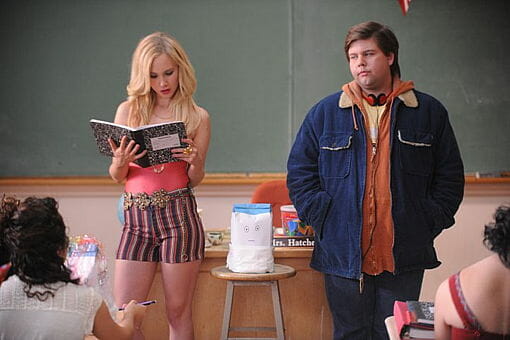By Brock Wilbur · October 10, 2011

Tone tends to be the barometer by which you can accurately determine the sanity of a director. Smooth, consistent work means you’re dealing with a guy who works in product– there’s a goal to be met and this script must be made visual. Inconsistent tone, nine times out of ten, means you’ve got someone swinging for bleachers—there’s a million emotions/ideas/dreams being distilled into one hundred minutes of entertainment, and this crazy S.O.B. wants to fit them all in there. Here’s where you find your Richard Kellys and your David Lynchs. The sort of people who deserve their following, because even at their worst, you know you’re going to see the product of an artist going all in. There’s a thousand bad films released each year, but the blah ones are so often the result of a boring filmmaker sticking to what they know or what they think others want to see. That’s why I’ll see an unbalanced bad movie any day of the week, but a by the numbers genre film (even with better reception) fails to get me into a theater. Genius never plays it safe, and neither do idiots, but both make for something worth my time.
Dirty Girl follows the story of Danielle (Juno Temple), a promiscuous troublemaker of a Norman, Oklahoma high school in 1987. Reprimanded to a special “troubled student” unit, she becomes frienemies with the overweight, gay Clarke (Jeremy Dozier) when they are tasked with playing fake parents to a package of flour for six weeks. Danielle’s mother (Milla Jovovich) is about to marry a Mormon (William H Macy) and Clarke’s father (Dwight Yoakam) is trying to beat the gay out of his son. The two delinquent students rob their families and set out on a cross-country journey to find Danielle’s real father in California.
Abe Sylvia’s directorial debut is tone deaf. But that’s what saves it.
The premise of two eighties kids having a friendly road-trip adventure would wear thin quickly, but Sylvia doesn’t really let you know what kind of movie you’re watching. The Dirty Girl in question cleans up her act as soon as she finds a friend, so it’s not the rebel without a cause you’d expect. It’s in love with the time period and milks every bad haircut and song for all it’s worth, but strangely Le Tigre’s “Deceptacon” becomes the de facto theme song. The first act seems to be all about harshly criticizing each character while laughing at their shortcomings, but the second act almost immediately demands pathos. Also in the second act, at some point the rules of this world’s reality begin to slip away and a number of impossible events occur, usually for the sake of either cuteness or a joke, but when it starts you really can’t avoid the jarring sensation.
While others will hate the film for these, amongst many other choices, it’s the reason I found myself so endeared to the whole thing. See, Sylvia VERY OBVIOUSLY has lived and loved this story, and his dedication to the material is the film’s greatest strength. There’s a lot of complicated, painful, and frustrating situations that Sylvia needs us to look at, but to make that pill easier to swallow he’s hidden it in with a bunch of candy. Sweet, music-video inspired candy. Truly, I wouldn’t be surprised if Sylvia had no idea that this film did not accurately portray what really happened in his own life. It feels like someone remembered their childhood through the lens of early MTV and the movies of a different era.
Dirty Girl comes off like the lost work of John Waters, sometime between Hairspray and Cry Baby. Complicated issues hidden under offensive jokes and awesome/awful music, set in a small Midwestern yet maliciously bent version of Americana… Yeah, it’s all here. But Waters learned to never take the candy away entirely, and Sylvia doesn’t concern himself with this rule. He figures you’re hooked, so when we hit the late second act with the life-reflections of a hitchhiking exotic dancer (Nick D’Agosto) or the cruel moments of reunion in California, the silliness disappears completely, only to disorientingly re-emerge a few scenes down the line and remind us we’re not in the kind of movie where you should feel that upset.
There are two completely different movies playing out in Dirty Girl. One is a few edits away from becoming the introspective indie character study of a Terri or a Waitress. The other is the summer fun reality bender like The Sweetest Thing. The crossover may be greatly flawed, but it hits a sweet spot that makes Dirty Girl work for me, since I’d rather enjoy this version than either of the polarities it could have leaned towards.
But as with most smaller films, Dirty Girl comes down to the performances, and this cast will not let you down. Jovovich does some of the best acting of her entire career, Temple proves exactly why she’s the new Hollywood “It Girl”, D’Agosto hijacks the film for fifteen minutes in such masterful fashion you’ll be crushed when he goes, and Dozier has laid the groundwork for a fantastic future career.
I could’ve gone without the last five or ten minutes of the film, as a point of satisfactory resolution is reached multiple times, but then stretched out egregiously to make time for one last, really predictable musical number. But getting to that point is such a worthwhile journey, that while complicated and executed strangely, it meant a whole hell of a lot to someone. And when you care too much, why should tone matter? I’m not entirely sure what we were supposed to take from the experience, but it seemed to matter more the less we focused on the matters. Sylvia swung for the fences, and while he didn’t hit a homerun, he did deliver some memorable strikes.